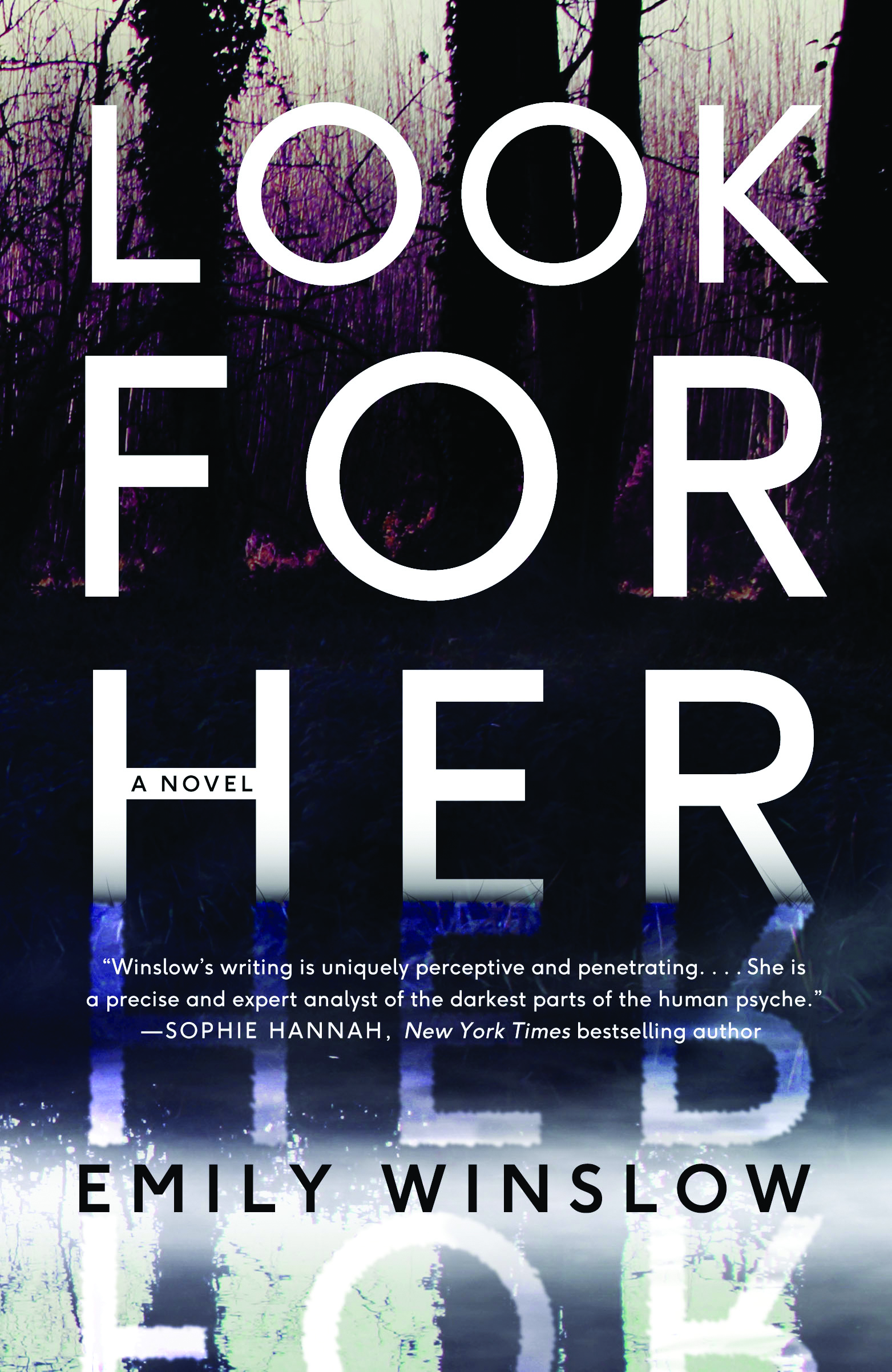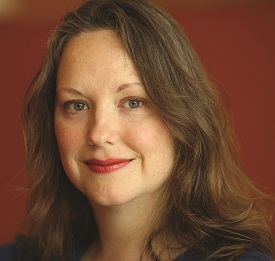 I welcome author Emily Winslow to Colloquium for the first time in conjunction with the Partners in Crime online tour for her latest novel, Look for Her.
I welcome author Emily Winslow to Colloquium for the first time in conjunction with the Partners in Crime online tour for her latest novel, Look for Her.
What Would We Do Without Them?
The needs of family can get in the way of writing, but it can also be family that inspires and supports writing.
I started writing my first crime novel, The Whole World, back when our younger son was eleven months old. He wasn’t much help then, but with subsequent books he and his brother became useful. They helped me brainstorm motives, and tagged along on a journey out into the fens to figure out the exact spot where a body should be discovered (The Start of Everything).
But the most memorable way that family have supported my writing happened before they were born. When I was newly married and freelancing, I popped the floppy diskette with my latest full-length project into my computer. Nothing; the computer couldn’t read it.
I tried it in my husband’s home computer, a more advanced model. Still nothing. I phoned him at work to ask his advice. He designs computer chips and knows his way around pretty much everything electronic; perhaps there was something to be done that he could walk me through?
None of it worked.
So he left work early, rushed home, and retried all of those things himself just to be sure. No result; the disk was dead. I was devastated. I hadn’t backed it up.
But I had printed it out.
We sat together for hours that afternoon while I read aloud from the last printout of the whole manuscript and he typed it all back in for me, every word. (And, yes, we saved it AND backed it up.)
I asked authors Karen Dionne, Kristina Riggle, C.F. Dunn, Lauren Baratz-Logsted, Jenny Milchman, and Jamie Mason how their families have supported their writing. As in my life, husbands figured prominently, and also children, and a hilariously well-meaning but overzealous sister.
Karen Dionne, author The Marsh King’s Daughter
“Supper is ready.” Every day, week in and week out, somewhere between 5:00 and 6:00 p.m., I get this text from my husband. Not only does he prepare all our meals (and as a bonus, my husband is an excellent cook!), he does the grocery shopping, runs errands, takes my 90-year-old mother to her doctor appointments — all so I can write. My husband is not a naturally demonstrative man, but I know if I were to run these three little words through Google translate, the answer would come back: “I love you.”
Kristina Riggle, author of Vivian in Red
After my second child was born, I was trying desperately to finish my work in progress, and not finding any time between freelancing, my energetic preschooler, and the baby who would only nap for snippets of time. My husband decided to kick me out of the house on Tuesday nights; lest you think one night a week was a pathetic offering, he’d have happily given me more time, but I was too anxious and guilt-ridden to accept it. Every Tuesday night I fled to a coffee shop and got a solid couple of hours where I would not have to wipe a single nose or change a single diaper or roll a single Matchbox car across the floor. This helped me finish the book which became my debut novel, Real Life & Liars.
C.F. Dunn, author of Mortal Fire, the first book in the Secret of the Journal series
With a book to write and a deadline to meet, a house fire was the last thing I needed. Despite the demands of his career, my husband would come home, sort out the builders, prepare and cook dinner, and oversee our daughters’ homework. At weekends, he shopped, tidied and laundered, while I huddled in a corner and wrote my heart out. He never once complained; but when my editor phoned one day, he asked to whom he was speaking.
“Call me Cinders,” came the reply.
Six books later, and we’re still having a ball.
Lauren Baratz-Logsted, author of Zombie Abbey
What’s the greatest single act of support my family has provided for my writing career? In December 2006, my then six-year-old daughter and my husband helped me conceive and then brainstorm the plot for what would become The Sisters 8 series for young readers which has since sold over a quarter of a million copies. When I asked my daughter, an only child, what she’d like a book to be about, she said sisters. When asked how many, she said eight. If she’d said something different, there’d be no Sisters Eight! Maybe it would be the less-spectacular Sisters Three! Of course, once she grew a little older, realizing what a great deal she has going here, she no longer wanted even one sister.
Jenny Milchman, author of Wicked River
Well, we did rent out our house, trade in two cars for an SUV that could handle Denver in February, pull the kids out of 1st and 3rd grades to “car-school” them in the back seat so we could live on the road for 7 months, promoting my first novel. Who worked the hardest? My husband, doing his job from the passenger side—thank goodness he’s not a surgeon—and helping make my dream come true.
Jamie Mason, author of Monday’s Lie
Back in 2013, in the days following the release of my debut novel Three Graves Full, my sister found herself struck by inspiration while browsing the aisles of a Metro DC area Best Buy. Nearly five years later, I still can’t bring myself to go into one. I keep thinking an alarm will go off if I cross the threshold, or at the very least, my photo will be on the wall behind the cash registers: PERSONA NON GRATA, ALERT SECURITY IF JAMIE MASON IS SEEN ON THE PROPERTY.
My sister switched every internet device — every single one in the entire store — to the web page for my book. Then she called me, glowing right over the hundreds of miles of airways, to crow about her great idea.
Me: Honey! That makes me look like a crazy person!
Her: No, it doesn’t. Why would anyone think you did it?
Me: Why would they think anyone but me did it?
We have an agreement now. All spontaneous promotional epiphanies will be run by me before they’re implemented. It’s working well. But don’t ask me why everyone in a small town in central Texas thinks I wrote The Hunger Games. That’s a different story and it’s my mom’s fault, not my sister’s.
And still, it’s so much better than life without their love and support.
Meet Emily

Emily Winslow resides with her husband and two sons in Cambridge, England, although she is American. Emily trained as an actor at Carnegie Mellon University’s prestigious drama conservatory and earned her master’s degree in museum studies from Seton Hall University. For six years she wrote for Games magazine, creating increasingly elaborate and lavishly illustrated logic puzzles. She currently teaches at the University of Cambridge Institute of Continuing Education at Madingley Hall.
Emily is the author of The Whole World, The Start of Everything, The Red House, Look For Her, all of which are crime novels set in Cambridge. She also penned a memoir, Jane Doe January.
Connect with Emily via her website, Goodreads, Twitter, or Facebook.
Excerpt from Look For Her
From Chapter One
Annalise Williams (Wolfson College),
University Counselling Service,
recorded and transcribed by Dr. Laurie Ambrose
My mother picked the name Annalise for me because of a girl who was killed. Her name was Annalise Wood, and she went missing when she was sixteen. My mother was the same age when it happened. Annalise was lovely, much prettier than my sister and I ever became. She was the kind of girl you look at and think, “Of course someone would want to take her.”
Don’t look at me like that. I know that what happened to her was awful. It just seems a very fine line between being the kind of person that others want to be with and be like and treat well, and being the kind of person that some others, just a few, sick others, want to take for themselves. That’s the same kind of person, isn’t it? The loved and lovely. Isn’t that from a poem somewhere? That’s what she was like. That’s the risk when you’re the kind of person who’s wanted. Good people want to be close to you, but the bad people want you too.
There were two photos of her that the media used most: her most recent school portrait, and a snapshot of her laughing, with the friends on either side cropped out. Taken together, they presented the two sides of a beautiful and perfect person: poised and thoughtful, and spontaneous and bubbly. The kind of person who deserves help and attention.
Realistically, if they wanted these pictures to help strangers identify her if they saw her out and about with the bad man, they should have used photos of her frowning or looking frightened. Either there weren’t any (which may well be the case; who would take a photo of that?), or they couldn’t bring themselves to advertise a version of her that was less than appealing. The narrative is important. If you want the “general public” to get worked up, you have to persuade. Attractiveness and innocence must be communicated, even if emphasising those traits makes the real person harder to recognise.
In the end, she was already dead, so it’s a good thing, I suppose, that they used the nice photos. They’re the images that everyone remembers. My mum was a teenager when those pictures were in the paper every day for weeks, then weekly for months. Annalise Wood was the most beautiful girl in the world. Everyone cared about her. It’s what any mother would wish for her child, to be the kind of person that everyone would care about and miss if she disappeared.
It wasn’t until Mum was over thirty that what really happened to Annalise Wood was discovered.
Enjoy my review of Look For Her.



2 Comments
Family support is priceless!
Couldnt write my two mystery series without Doc’s help, from walking the dogs and making meals, to reading first drafts and giving me a male perspective ~